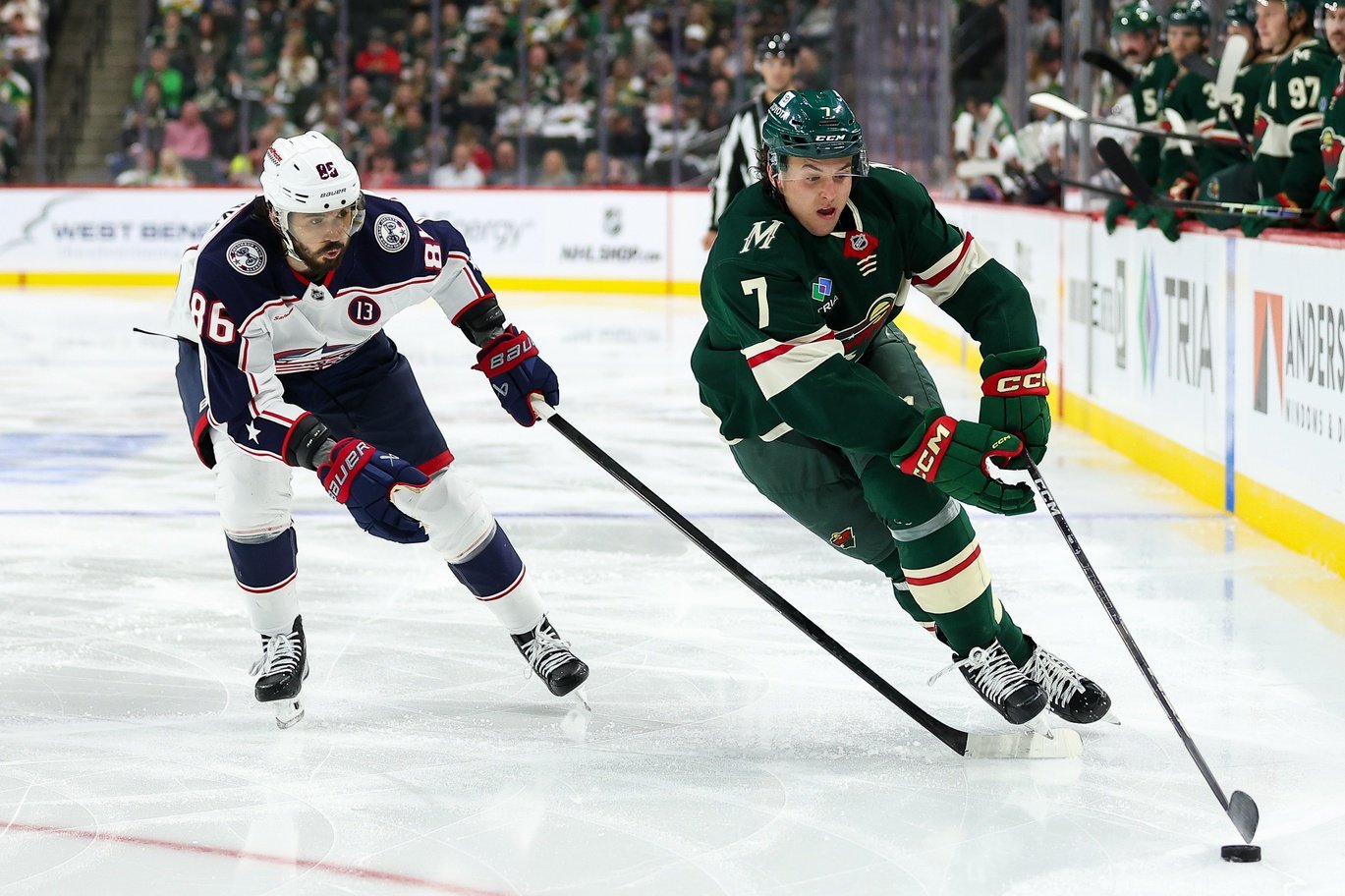
Brock Faber’s emergence as an elite-level defender has been among the most exciting Minnesota Wild storylines. Last year, Faber was a steady presence for a Minnesota defense that went through a lot of upheaval.
Early into his second full season, Faber is still fulfilling his potential. The former Gopher is honing his brand of exciting play that blends defensive responsibility with a willingness to join on the rush and mix it up offensively. His first goal of the year came on a give-and-go deflection against the Philadelphia Flyers, showing his willingness to be aggressive in the offensive zone.
For all the excitement surrounding the Wild’s hot start and Faber’s solid play, a central narrative remains crucial for Minnesota’s season: they are asking a lot from the Maple Grove-born defenseman. At just 22 years old, the defenseman has more responsibility than any other blueliner on the team.
Brock Faber faces difficult deployment
Coming into the year, there was hope that Faber could replicate his play from the beginning of last season more than the second half. The defender had a great rookie year but saw his value diminish towards the end of the season.
Faber fractured his ribs, which hampered his play, and had a lot of responsibility for a rookie. With the team facing injuries, especially to stalwart Jared Spurgeon, Faber became the Wild’s undisputed No. 1 defenseman. He performed admirably, but it was exciting to imagine that he may have some more support coming into this year.
Unfortunately, that hasn’t panned out. Spurgeon is hurt again, meaning the team will lean on Faber again. If anything, the Wild are asking even more this year.
Faber is playing even more
The number of minutes Faber played last season highlights his heavy workload. The Wild asked him to play more than nearly anyone in his age group, and this trend became one of the defining characteristics of his breakout rookie campaign.
2023-24 (All stats sourced from moneypuck.com)

Faber played the fifth-most minutes of any defender in the NHL and ranked sixth in his share of total possible ice time. While being able to log heavy minutes is beneficial for a defenseman, it’s unusual for a rookie. Injuries forced the Wild to rely on Faber at that level last year, but it would be risky to lean on him that much again. In a concerning development, the Wild are using him even more this season.
2024-25

Faber averages 25:48 TOI (time-on-ice) a game, or 42.5% of possible ice time. When you look at the rest of the top ten in the league in share of possible ice time, Jake Sanderson is the only player of a similar age and experience level to Faber. High-end veterans like Miro Heiskanen and Roman Josi dominate the rest of the top ten.
Playing with an unintended partner
The Wild entered this season with a top four of Brock Faber paired with Jonas Brodin and Jacob Middleton with Jared Spurgeon. The defensive core gave plenty of reasons for optimism. Spurgeon is a major part of Middleton’s success with the Wild. At the same time, Faber and Brodin were incredibly effective together last season.
2023-24

Unfortunately, Spurgeon is on the shelf again, forcing Faber to play with Middleton. Faber and Middleton have been valuable playing with different partners in the past. But if last year was any indication, they don’t work together. A large part of Faber’s decline in the second half of the season is due to playing with fractured ribs. Still, it’s impossible to ignore that much of that decline came when he played with Middleton.
2023-24

The pair didn’t mix. Faber produced less offensively and was less successful defensively compared to his time with Brodin. The Wild are pairing Faber with Middleton again, which is cause for concern.
Between his minutes and deployment, Brock Faber has the most difficult job in Minnesota. The team relies heavily on Kirill Kaprizov to run the offense, but he at least has some high-end help in Matt Boldy, Joel Eriksson Ek, etc. Conversely, Faber is on a bit of an island.
Jonas Brodin is getting older, and Jared Spurgeon is often injured. The team is asking a 22-year-old in his second year to carry nearly the entire load.
Increased expectations are warranted
When Faber was a rookie, it was shocking that a player of his experience level had so much responsibility. Faber, 22, had to mature quickly in the league. The Wild rewarded Faber’s excellence with an 8-year, $68 million contract. Now that he has cemented his future, it’s natural that Minnesota would expect Faber to shoulder the most difficult assignment on the team.
Brock Faber is one of the most important pieces of the Wild’s young core. Recognizing that his deployment is a vital step in his development is crucial. His new contract is that of a No. 1 defender; he’s just having to take that responsibility a little earlier than expected.
Brock Faber is living up to the pressure
It’s important to acknowledge the Wild's reliance on Brock Faber and that he’s always risen to the occasion. Faber is developing into a defensively responsible defender who still contributes offensively while controlling games. His ability to dictate the flow of play while logging a significant number of minutes is reminiscent of Duncan Keith or a prime Ryan Suter.
Look at the Wild’s domination of scoring chances with Faber on the ice:
2024-25

Minnesota is far better off when he’s on the ice. Last season, Faber showed flashes of brilliance but underperformed in relative expected goals percentage.
2023-24

The Wild must be enthused that Faber is improving significantly despite a more difficult deployment strategy.
Another crucial development is Faber’s ability to play better minutes with Jacob Middleton. As discussed earlier, the Middleton-Faber pairing performed notably worse than Faber’s pairing with Brodin. The Middleton-Faber couplet is once again playing a lot together. Middleton-Faber isn’t without its warts, but they’re still winning their minutes.
2024-25

When you compare this year's Middleton-Faber pairing to last year’s, you can see a marked improvement. The partners are especially better defensively, with an upgrade of .81 expected goals per 60 minutes. Playing well, even in an unideal situation, is a vital development for Faber. He’s proving he can drive positive results outside his partnership with Brodin.
Ultimately, the Wild are playing a dangerous game with Faber. He can shoulder the workload, but they’re putting him in a difficult situation. It will be interesting to see if he’ll continue to develop as an elite defender who can play half the game or if overuse further impacts his game. If current trends continue, Faber is on the right path.
Think you could write a story like this? Hockey Wilderness wants you to develop your voice, find an audience, and we'll pay you to do it. Just fill out this form.
-
 1
1
-
 1
1







Recommended Comments
Join the conversation
You can post now and register later. If you have an account, sign in now to post with your account.
Note: Your post will require moderator approval before it will be visible.